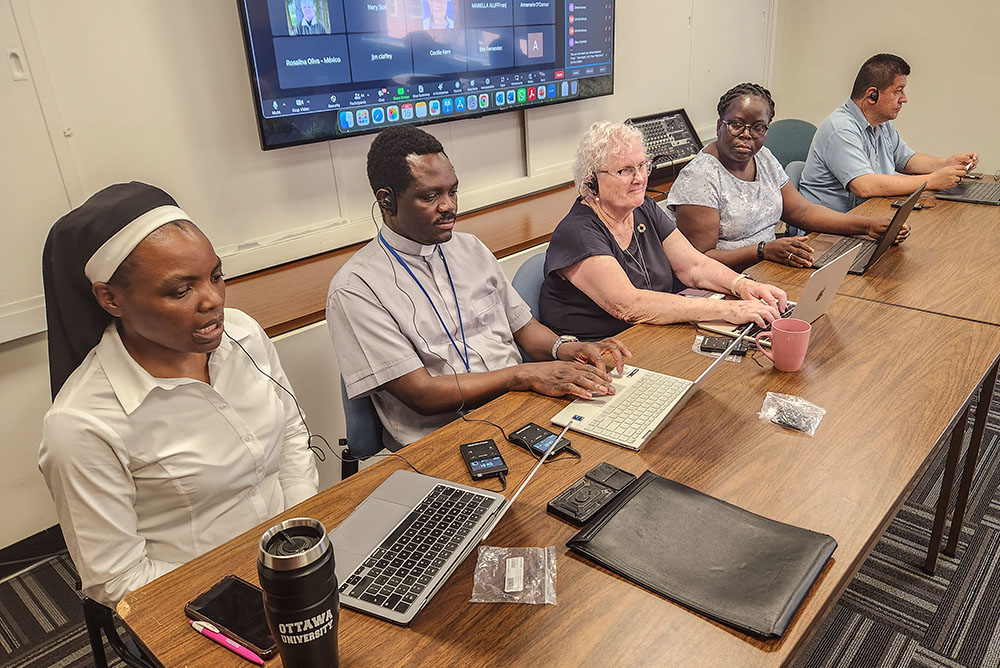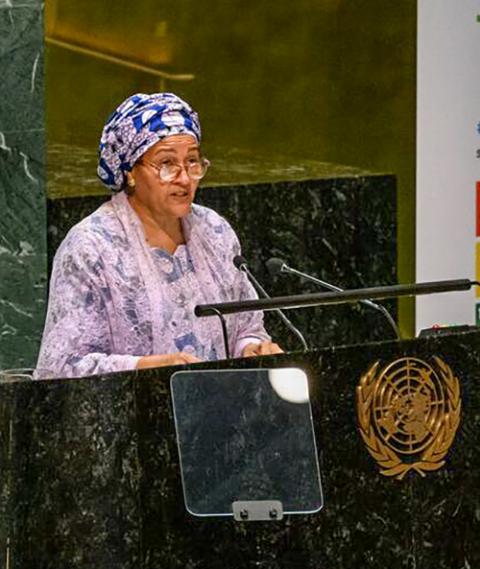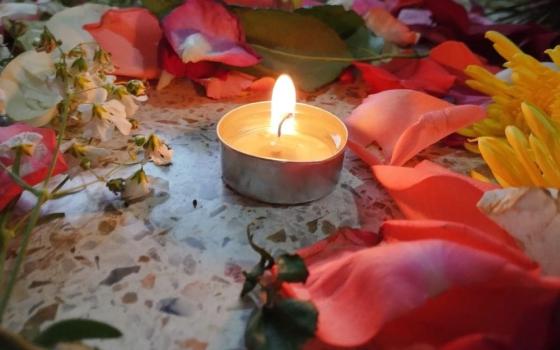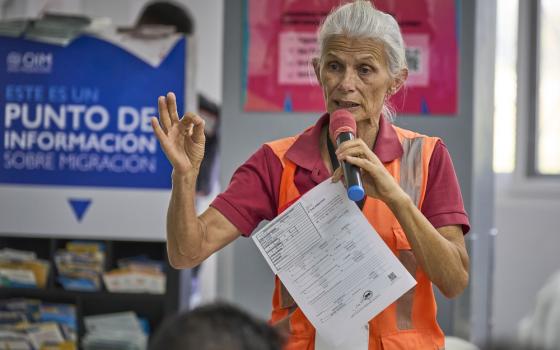
Dominican Sr. Sarudzai Mutero, left, speaks July 15 at a "parallel event" at the Church Center for the United Nations during the U.N.'s High-Level Political Forum, held July 8-17. Others included, from left, Dominican Fr. Emmanuel Mulu; moderator Adrian Dominican Sr. Durstyne "Dusty" Farnan; Sacred Heart of Mary Sr. Beatrice Magaya; and Claretian Fr. César Espinoza. The parallel event was organized by the Society of the Sacred Heart; the Dominican Leadership Conference; Fondazione Proclade Internazionale-Onlus; and the Religious of the Sacred Heart of Mary. (GSR photo/Chris Herlinger)
Sisters and clergy attending meetings this week at the United Nations to assess the world body's ambitious goals to end poverty and other social ills are hailing progress being made at the grassroots. But they also say it is not realistic to expect that the targets, known as the sustainable development goals, or SDGs, will be achieved by a 2030 deadline.
"There is progress being made, but often at a small scale," said Dominican Sr. Sarudzai Mutero, an educator from Zimbabwe who serves as justice and peace promoter for Dominican sisters in southern Africa.
She hailed progress in Zimbabwe in such areas as climate change and education but said that overall her country continues to face economic challenges. "To say that we'll be done by 2030, no — I don't see that happening," Mutero said in an interview about the U.N.'s deadline for achieving the 17 goals.
Mutero and other representatives of faith-based groups spoke July 15 at a "parallel event" at the Church Center for the United Nations during the U.N.'s July 8-17 High-Level Political Forum to assess progress for the 2030 agenda.
All seven of the participants at the event — four in person at the Church Center and three online — affirmed the progress they see in projects and ministries sponsored by their congregations and other religious groups.
But all stressed steady and committed work is still needed, as many of the problems facing the global community will not be solved in either the short or long term.
Advertisement
"We have assumed an attitude of cautious optimism that these SDGs will be realized, albeit not in full, by 2030," said Dominican Fr. Emmanuel Mulu, a veteran of development and peace work in his native Kenya and who is currently special adviser on mission and global networking at Providence College in Rhode Island. "In hope we live."
Grassroots work, such as that of sister congregations, is making a difference, said Sr. Beatrice Magaya of Zimbabwe, representing the Religious of the Sacred Heart of Mary and one of the presenters.
"Acting locally and touching the lives of the people where we go contributes to the journey towards 2030 and beyond," she said, describing the work of sisters and others as "little steps marking the journey going forward."
Cautious optimism was on display during the formal U.N. meetings, when Amina Mohammed, a Nigerian diplomat who is the deputy secretary-general of the United Nations, told gathered delegates at an opening session on July 8 that their commitment to the sustainable development goals must not waver.

U.N. Deputy Secretary-General Amina Mohammed addresses the opening of the High-Level Political Forum 2024 on July 8 at U.N. Headquarters in New York. (UN Photo/Loey Felipe)
"Although the greatest challenges before us are daunting, together we can overcome them, [and] achieve the peaceful, prosperous and sustainable future that all people not only need but deserve," Mohammed told delegates assembled at U.N. headquarters, and as quoted by U.N. News.
A cornerstone of the U.N. meetings was for U.N. member countries to assess progress on several of the sustainable development goals, including Goal 1 (ending poverty); Goal 2 (ending hunger); and Goal 13 (taking action on climate change).
Participants of the Church Center event mirrored their own countries' assessments of progress and continued challenges in a format called voluntary national reviews.
Mutero, for example, said the Zimbabwe government, mindful of many challenges, is initiating programs to eradicate poverty; end hunger; promote good governance; and advocate for climate change mitigation.
And yet with the collapse of the country's agricultural industry, she said, mining and extraction industries have become the main source of foreign currency in Zimbabwe. That has affected "land, water, air and forest degradation," Mutero said, as well as causing the displacement of many poor rural communities in order to make way for new mining operations.
The sustainable development goals, she noted, "exist as a complex interconnected web, and failures in one sector can have cascading effects on the others."
In response, Mutero said, promoting education "that is holistic and that addresses the needs of our time" is one way to begin to tackle this and other challenges. She lauded her congregation's commitment in providing "quality relevant education for different groups of children, empowering women and girls and those with special needs."
Like Mutero, Magaya sees hope for Zimbabwe, and said the national government is committed to building "a resilient, equitable and prosperous future for all its citizens, ensuring that no one is left behind in the pursuit of sustainable development goals."
She praised progress such as a decrease in the nation's maternal mortality rate; increased participation of women in government leadership and decision-making; and better access to safely managed water, sanitation and electricity.
But even with better access, infrastructure challenges remain, with frequent cuts of electrical power, for example, which are felt dearly in hospitals and health facilities, endangering lives, particularly in maternity wards, Magaya said.
Meanwhile, she added, drought continues, endangering the nation's food supply. "Hunger," she said," is no longer just a thought but a battle for many households."
Noting the long history of her congregation in Zimbabwe — 67 years in all — Magaya said that in small but important ways, the sisters' ministry is helping bring the development goals to fruition, whether through strengthening health facilities, promoting education or providing feeding programs for children.
For his part, Mulu praised efforts in Kenya to promote access to credit to assist women and those from marginalized groups. He said government programs are providing skills training for youths and are promoting internet access for job creation.
Another priority has been to introduce and expand school feeding programs, which in turn has helped boost the numbers of those attending school. In the area of climate mitigation, Mulu said the national government has introduced a program to plant 15 billion trees by the year 2032. The government has also banned the use of single-use plastic bags in the country.
The work of Mulu's congregation encompasses all of these themes, as well as a commitment to peace, justice and strong institutions — another sustainable development goal — by closely following issues of documenting those recently killed in Kenya as a result of police brutality and extra judicial killings.
The meetings of the last two weeks are seen as a bridge between a 2023 SDG Summit and a major United Nations gathering in September — a Summit of the Future, which the U.N. describes as a high-level event to promote global cooperation, "bringing world leaders together to forge a new international consensus on how we deliver a better present and safeguard the future."
In an interview following the Church Center event, Adrian Dominican Sr. Durstyne "Dusty" Farnan, who represents the Dominican Leadership Conference at the United Nations and who moderated the July 15 meeting, said she hopes that at that meeting and into the future, the United Nations will examine the issue of a serious impediment to achieving the sustainable development goals — the debt imposed on poorer nations.
"We need governments like the U.S. to step up on this issue," Farnan told GSR. "And the U.N. itself needs to be more supportive of poorer countries."
Other participants in the July 15 event included, in New York, Fr. César Espinoza, of Guatemala, a Claretian Missionary; and online, Mexican Sr. Maricruz Trigueros Manzo of the Religious of the Sacred Heart; Indian Sr. Smitha Muthu of the Institute of the Blessed Virgin Mary, or Loreto Sisters; and Colombian Fr. Norbey Tapiero, a Claretian Missionary.







